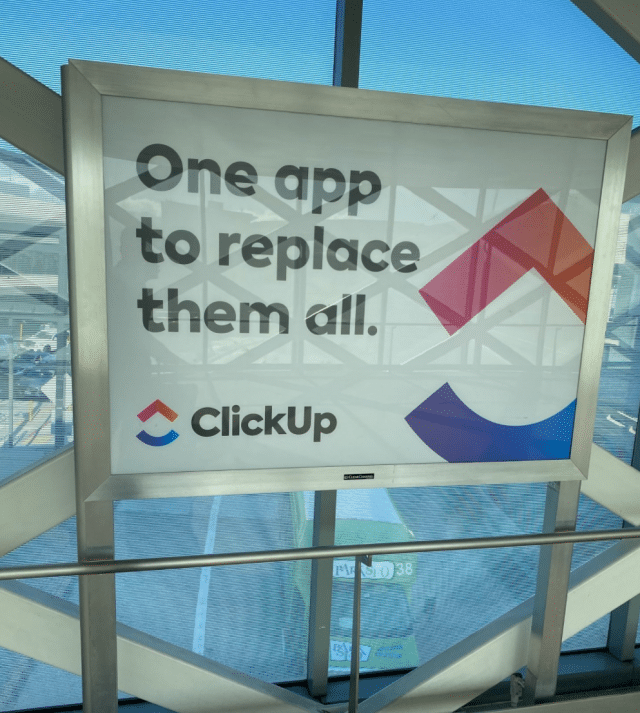The overpromise of technology

Last month on Twitter, tech writer Casey Newton posted the above pic, observing that he sees it all over San Francisco. "This ad is all over SF and I can’t decide what I dislike more: the wild overpromising or the total lack of information about what it does," he said.
I’ve noticed the same ad but it didn’t register as much with me as it did with Casey because these messages have finally exhausted me. It’s because the constant overpromise of technology has been going on for years. From a well-founded and ongoing skepticism about what AI actually is and can be, to the ill-founded hype that touches almost anything tech-related these days, both the perception and reality of technology need an adjustment.
Mark Zohar, the President and COO of tech company Viafoura explains the motivation for technology’s overpromise:
I think the overpromise of tech is generally the result of the unbridled optimism of those creating the tech that given enough time, tech can solve all problems. The disconnect is between that naive optimism and the real world expectations and user experience challenges experienced by those who use the tech.
Part of this disconnect is that we are almost never all speaking the same language. This isn’t as big of a deal when we are looking at something comparatively esoteric in tech that applies to very few people who all understand each other. But it is increasingly important when the technology in issue applies to a lot of people, as in the image above with apps.
What will the hundreds of thousands of people (if not more) who see this exact ad at San Francisco International Airport and all of the other places it will reside actually think? Is this finally THE real killer app, one that will make it possible for me to use nothing else on my smartphone or computer?
I wrote last year about online political advertising and what is and isn’t okay in the ads that either enrich or gum up (depending upon your perspective) out feeds and inboxes. The Federal Trade Commission has Rules of the Road, that were designed to "help maintain the credibility of the internet as an advertising medium," which is impossible to do when online advertisement internationally straddles the line between deception and reality. If politics has been the most high-profile culprit, technology hasn’t been far behind.
While political ads trade on disinformation, technology ads trade on no information, as the "one app to replace them all" image perfectly reflects. A lot of people think they understand politics. So political advertising, done well and often dastardly, trades upon your knowledge to re-mold your beliefs. In politics, the "if y then z" is dependent upon you having a well-formed "y" so we can use misinformation to help shape out desired "z."
Yet with technology ads, we often shape both the "y" and the "z." The ClickUp ad assumes a pain point that I know enough about technology to realize I don’t have as it proposes a solution I know doesn’t exist. The apps I use in my life are fine, thanks. I add some once in a while and delete others. Sometimes I group them together into handy boxes and I’m always wary of apps that want to know more about other things I use or do than I want. I don’t even like signing into one app with another. So the idea of one app that knows every other app I use is more nightmarish than zen for me. I don’t want my apps to marry, I don’t even want them to be in the friendzone.
As end users, when we are inundated with messages about what technology can do for us, especially when we aren’t that "us" the tech is addressing, we let our defenses down and don’t push back against either the tech or the message. John Lawlor, a South Florida personal injury lawyer, argues that while many of us are often generally distrustful of technology, sometimes we put ourselves at peril by being too trusting:
With so many media messages about how we need to always be careful with technology, we just become desensitized to it sometimes. What this means is that when we really do need to be wary of what technology is promising us and we aren’t, we can be harmed in many different ways.
We really shouldn’t need any reminders of the harm technology can do to us when we overtrust its promises. If the ongoing trial of Elizabeth Holmes teaches us nothing else -- and it very well might not -- it’s that we are the ones who ultimately lose when we use technology that overpromises. That applies equally to whether the promise is about too good to be true blood testing technology or about a car that’s going to change how we consume energy and what energy we consume. When we allow technology to overpromise through either our action (using and buying the tech) or inaction (doing and saying nothing when we see ridiculous promises such as the one app to replace them all) we become part of the process that allows it all to move forward.

Aron Solomon, JD, is the Chief Legal Analyst forEsquire Digital and the Editor of Today’s Esquire. He has taught entrepreneurship at McGill University and the University of Pennsylvania, and was elected to Fastcase 50, recognizing the top 50 legal innovators in the world. Aron has been featured in CBS News, USA Today, ESPN, TechCrunch, The Hill, BuzzFeed, Fortune, Venture Beat, The Independent, Yahoo!, ABA Journal, Law.com, The Boston Globe, and many other leading publications.